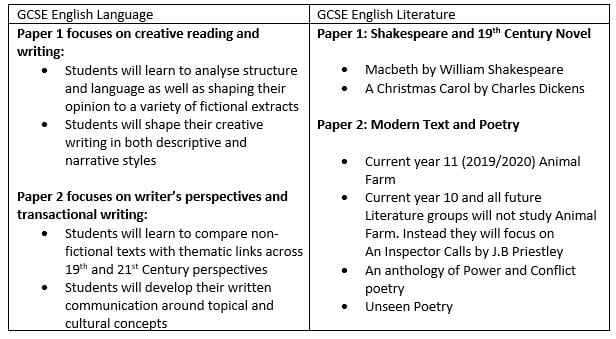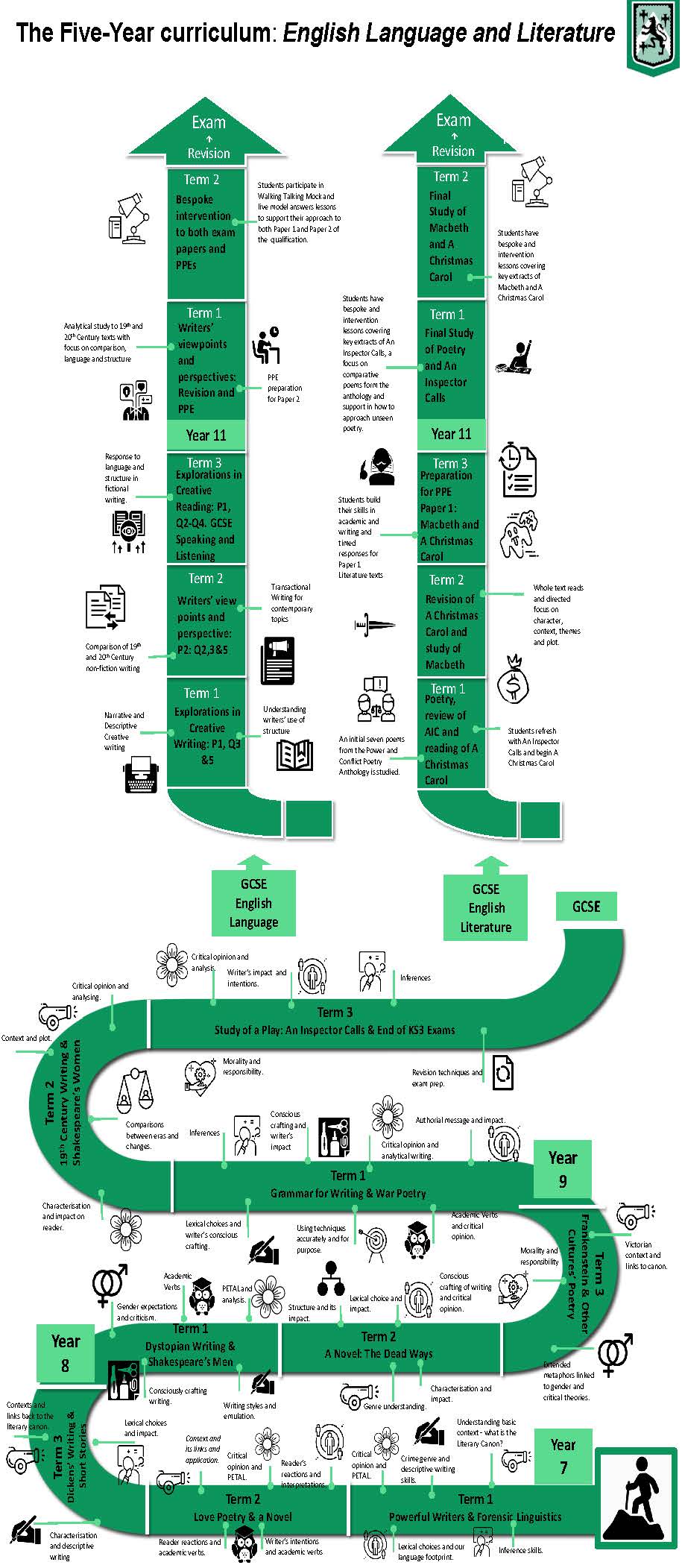English Intent
In English we want to develop independent learners; within our subject students will discover how to establish a personal line of enquiry and how to equip themselves with the skills which build resilience. We will give students the opportunity to work on their own, in pairs and in groups. We expect students to continue to facilitate the learning of others by contributing to class discussions, group tasks and work in a productive and ambitious manner.
We will provide structure and frameworks to support students in their development as readers and writers, ensuring learning is differentiated to enable all students to make excellent progress. Clear and precise communication skills are important to us and will become more refined as students grow in confidence.
We will use agreed pedagogy to help students craft their responses to texts and become fluent readers. All learners will have access to quality first teaching which adopts a consistent approach to lesson delivery and utilises common resources. Students will be given home learning activities to promote supported self-study. Long term memory will be further developed through retrieval practice and knowledge organisers.
If you require any further information, please contact the Head of Subject via the link on our Contact Us page.
In Year 7, students are placed into sets based on their SATs English Comprehension score and their Maths score combined. During Year 7, there is no scope for them to move sets as the timetable is blocked so that they remain in their classes throughout the year. This allows them time to settle into the secondary routine fully and ensures that they make friends within their groups. At the end of Year 7, students are then moved into sets which are based solely on English grades. For this reason, students may find that there is movement between classes once they transition into Year 8. As we have moved to a KS3 ‘Life without Levels’, reports will indicate a progress level from Years 7-9 which aims to eliminate the immense pressure that pupils feel when being faced with grades. Students in KS3 receive regular feedback for both classwork and assessments meaning that they will have plenty of opportunity to act on advice. If you require any further information about this, please contact Miss Merrick, the KS3 Coordinator, at bethanymerrick@chellaston.derby.sch.uk.
Students in sets 1-5 have 8 lessons a fortnight of English where they work on both analytical reading skills and creative writing skills. Spelling, Grammar and Punctuation skills are woven into these schemes to ensure that these essential skills are a constant focus. For each unit of work that they complete, students take a ‘Warm task’ and a ‘Hot task’ which inform the grades that they are given for each Reporting session.
● Warm tasks are supported fully by the class teacher whereby students are shown examples and models of expected answers, have time to plan as a class and are given structured ideas in order to enable them to attain their highest possible grade.
● Hot tasks are independent and allow the students an opportunity to show off their learning and their best work. These will occur at the end of each scheme of work and the approximate dates for these can be found on the assessment calendar.
Library lessons:
Students throughout KS3 have 1 library lesson per fortnight. During this hour, students work on reading and comprehension skills and have the chance to apply their knowledge to wider reading material. The choices for Library books are as follows:
Year 7
The Goldfish Boy
The Light Jar
Year 8
Wonder
Trash
Lord of the Flies
Year 9
The Book Thief
Framed
Of Mice and Men
Set 6:
Students in Year 7 Set 6 have 10 lessons a fortnight. These consist of: 1 library lesson, 2 Lexia lessons per fortnight and 7 English lessons where students study Reciprocal Reader skills. The reciprocal reader focus, alongside the Literacy Programme from the Hackney Learning Trust, allows students time to consolidate and recall effective reading strategies which will benefit them in every subject.
Lexia Lessons:
Lexia is a reading programme designed to boost the reading skills of students. It is used within English as part of our ‘Catch Up’ programme and students in Set 6 in Y7 and Y8 have 1 hour of Lexia a fortnight. Some students access this through Lexia lessons and others access this through form time. It follows on from the programme that is used in some Primary schools so students find that it is familiar while being challenged appropriately for their studies in KS3.
Homework:
Within English, students at KS3 and KS4 receive 2 pieces of homework per fortnight. These are in the form of ‘Takeaway menus’ where students can choose one task to complete per week. The homework lasts for the full teaching term and utilises ‘flip learning’, where students study topics that have been previously covered or are going to be covered in the future in order to keep these subjects fresh in their minds. Homework is set on Firefly for classes but can sometimes be set for individuals where intervention work is needed to improve progress.
Intervention:
In English, we provide ‘Boost’ after school sessions for Y8 and Y9 students who may benefit from extra classes in order to make further progress. These students are chosen based on the most up to date data and there are 3 ‘waves’ of this intervention throughout the year. There are no more than 10 students in each session and the aim is to improve skills that can then be transferred into lessons and assessments throughout the students’ time at the Academy.v
In Year 10, students are introduced to AQA English Language and Literature and continue this into Year 11. Both Language and Literature are stand-alone qualifications, and each are completed with end of Year 11 GCSE exams. There is no controlled assessment with either qualification. Lessons are planned to meet all our learners’ abilities with high challenge and supportive strategies implemented throughout to aspire to all our students’ personal levels.
Our students are taught the necessary skills and content to meet the requirements of the exams sat at the end of Year 11. This is guided with a plethora of themes, topics and texts to foster a love of English. The schemes have been systematically planned for students to become familiar with creative and transactional reading and writing as well as introduced to all relevant Literature in Year 10. This then enables a smooth transition into exam focus for their Year 11 studies.
We successfully provide a wealth of support out of the classroom including lunchtime clubs, regular home-school communication, afterschool intervention, enrichment days including Language or Literature specified events within school, and trips to the theatre. This is closely monitored to ensure students receive the best form of support to aid their progression. Faculty staff continuously meet to standardise work and schemes for most effective practice.
After completion of KS3, students are placed in a choice of 6 sets across the two year halves. These sets are formed to meet their target grades.
The Key Stage 4 coordinator is Kathryn Spray and is contactable via email: kathrynspray@chellaston.derby.sch.uk

At A Level we offer Language and Literature courses, with both options being well subscribed. We offer English Literature (AQA B specification) and English Language (AQA specification) which is taught by a team of subject specialist teachers.
Students are expected to complete preparatory study prior to the start of their course and are then taught by two teachers who share the delivery of the syllabus.
Students aiming for A* grades at the end of Year 13 are invited to attend workshops in which they will explore sample responses and develop the independent skills needed to achieve a mark securely in the top band. Students select their own questions for their Non – Exam Assessment coursework, both for Language and Literature, ensuring that they can pursue their own areas of interest and knowledge.
Teachers regularly attend standardisation and moderation meetings, as well as inset training on successful strategies to stretch and challenge both ends of the ability spectrum. Students participate in extra-curricular activities such as an English discussion group and visits to watch performances of both their set texts and any other performances/ activities that will widen their subject knowledge.
